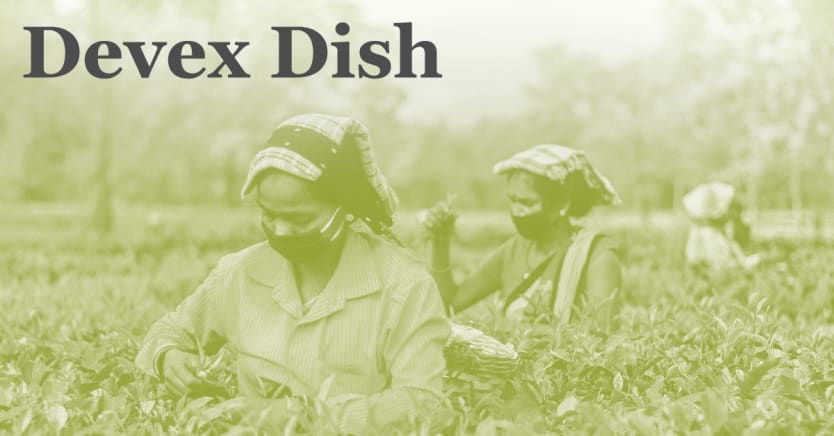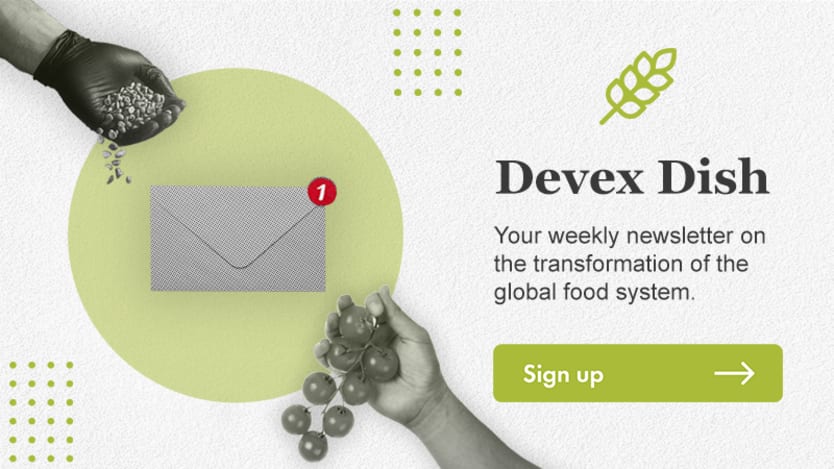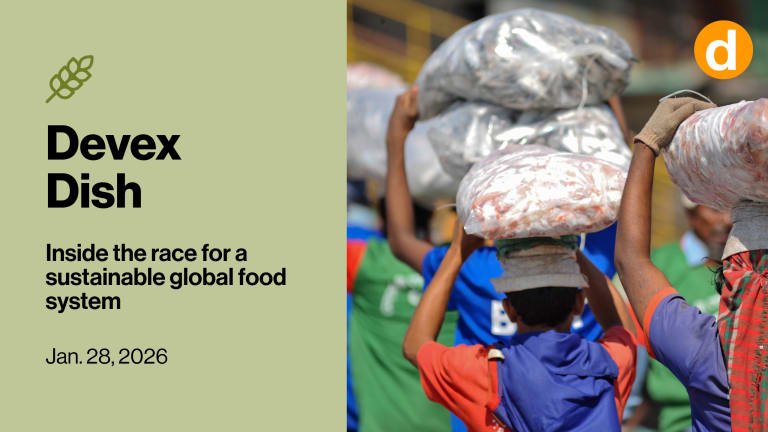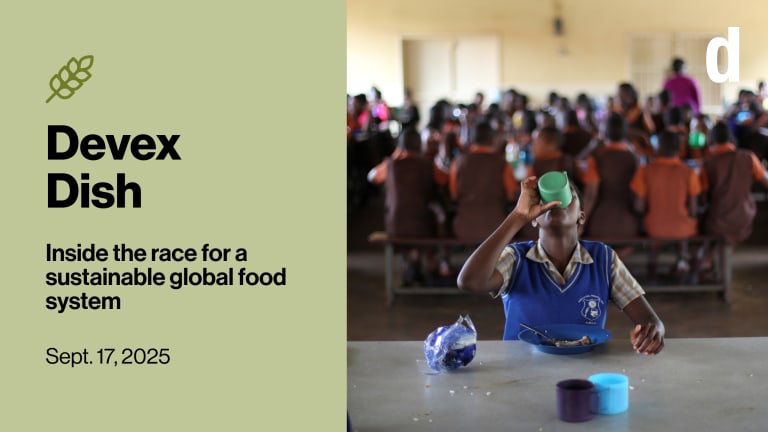Presented by Pepsico Foundation

The World Bank is out with dismal if unsurprising news on food inflation, finding that it is exceeding overall inflation while also hitting low- and middle-income countries the hardest. Lebanon — where a silo of rotting grain partially collapsed Sunday — is in the direst straits, with food inflation at 122% in real terms, compared with the same period last year. Zimbabwe, Iran, Sri Lanka, and Turkey round out the top five most affected countries.
This is a preview of Devex Dish
Sign up to this newsletter to get the inside track on how agriculture, nutrition, sustainability, and more are intersecting to remake the global food system in this weekly newsletter.
About 94% of low-income countries, 89% of lower-middle-income countries, and 89% of upper-middle-income countries have nominal food inflation levels above 5% compared with the previous year. Conditions are expected to further deteriorate in eastern and southern Africa, with South Sudan and Sudan at risk of famine. The bank suggested the solution could be more aid for affected countries, targeted at vulnerable populations and farmers.
The grim figures came as a grain shipment left Ukraine on Monday — a first since the Russian invasion began in February. While not expected to entirely solve the food crisis, releasing the country’s trapped grain to an anxious world market may help ease stress on food prices.
The United Nations has set up a “Joint Coordination Centre” for the Black Sea Grain Initiative — the international agreement to allow ships out of Ukrainian ports safely. With senior representatives from Ukraine, Russia, Turkey, and the U.N., the JCC says it will “enable the safe transportation, by merchant ships, of grain and other foodstuffs and fertilizers from three key Ukrainian ports in the Black Sea to the rest of the world.”
Read: World Bank data shows where food inflation is hitting hardest
+ What do you think? Will the grain shipments help ease the worst of the World Bank’s food security predictions? Write me with your thoughts at dish@devex.com.
+ I'll be offline next week for Devex’s annual summer break. You won’t be receiving Dish, but our team will be sending out special newsletters highlighting some of the most pressing development topics. Be sure you’re signed up for Newswire, our daily global development newsletter, to get my deep dive into food systems and climate in your inbox next Wednesday.
Flag, you’re it
We’ve heard a lot of discussion about the food crisis recently on Capitol Hill. Last week, members of the House Foreign Affairs Committee grilled officials of the U.S. Agency for International Development about the challenges of delivering effective humanitarian assistance when food and fuel prices are so high. Sarah Charles, the assistant administrator at USAID's Bureau for Humanitarian Assistance, said during Wednesday’s congressional hearing that the agency welcomes efforts to offer more flexibility in delivering emergency food assistance “for a time-limited, case-by-case basis.”
Bringing home the bacon: Your next job?
Food Security and Livelihood Program Manager
SOLIDARITÉS INTERNATIONAL
Mozambique
Charles was referring to amending cargo preference laws, which currently require USAID to ship in-kind food assistance on U.S.-flagged vessels. Members of Congress are increasingly in support of loosening these restrictions, with several Republicans on the House committee sending a letter to USAID Administrator Samantha Power last week encouraging the administration to waive cargo preference “for the purposes of the current global food crisis and global impacts of Russia’s war in Ukraine.”
Read more: US lawmakers call for cargo preference waiver to ease food aid costs
On the other side of the Hill, Senate Democrats on the Appropriations Committee last week released their proposed budget for fiscal year 2023. It includes $1 billion for food security and agriculture development programs, as well as a directive for the administration to create a new Global Food Security Partnership Fund. The fund would work with other donors, the private sector, and multilateral organizations to improve coordination in food security and resilience efforts. Read my colleague Adva Saldinger’s full budget rundown here.
Read more: A surprising US Senate foreign affairs budget bill
+ For more content like this, sign up for Devex Invested, the weekly newsletter on how business, social enterprise, and development finance leaders are tackling global challenges.
A mouthful
“In Africa, the food crisis can be averted. … We are very optimistic that will happen.”
— Kevin Urama, acting chief economist, African Development BankMy colleague Shabtai Gold sat down with Urama last week in Washington, where he found a rare beam of optimism amid the bleak news about the food crisis. Urama said he hopes AfDB’s new $1.5 billion emergency funding mechanism will help prevent a crisis in Africa. The bank recently approved the mechanism to increase agricultural production on the continent, including by introducing new technology to farmers. The goal? To get crop yields up and bring prices down.
AfDB chief economist: A food crisis in Africa ‘can be averted’
Swimming in debt
Upcoming events
ONLINE
Aug. 8
ONLINE
Virtual Conference on Rural and Agricultural Development in the Digital Age
Aug. 8-12
UNITED STATES
CEFS Symposium on Agriculture, Food Systems and Climate Change: A Call to Action
Aug. 11
ONLINE
1st International Conference on Food Waste to Food Sustainability
Aug. 24-25
Soaring debt levels have left the most affected countries at risk of defaulting and being unable to import basic supplies like food and medicine. Shabtai has this deep dive on the debt crisis for our Devex Pro members, spotlighting problems in nations like Sri Lanka — which in recent weeks saw protesters storm the presidential residence and even swim in its pool, following months of soaring food prices — that show the potential development impact of an economic meltdown.
Countries that are nearing default or generally lack hard currencies will struggle to buy food, fuel, and medicines on global markets.
Read: How the debt crisis imperils development — and why it's getting worse (Pro)
ICYMI: IMF warns of 'gloomy' economy rife with uncertainty and high inflation
+ Devex Pro members can also read up Shabtai’s explainer on the Sri Lankan debt crisis and the resulting soaring food costs and fuel shortages that befell the country. Not gone Pro yet? Sign up for a 15-day free trial today.
Number munching
$17 billion
—That’s the value of the productivity lost annually in Africa due to the effects of foodborne illness. In an op-ed for Devex, Delia Grace of Kenya’s International Livestock Research Institute writes that “hundreds of millions of people in Africa are much more likely to get sick and die from the food they eat” than COVID-19 or other diseases that can close down their economies.
“By incorporating livestock vaccination programs into strategies for tackling foodborne illness, governments can unlock double benefits for both human and animal health, as well as economic productivity,” Grace writes.
Opinion: Food safety — too long the Cinderella sister of 'One Health'
Chew on this
The Rockefeller Foundation plans to increase its climate action by focusing on food security in Africa, South Asia, and other regions likely to be impacted by severe droughts and flooding. [Devex]
IFAD has released its 2021 annual report, finding that “49 per cent of direct beneficiaries were women” in 2020. [IFAD]
USAID is providing $11 million to Mauritania, “where nearly 680,000 people are facing a dire hunger crisis” — the worst the country has seen in a decade. [USAID]









